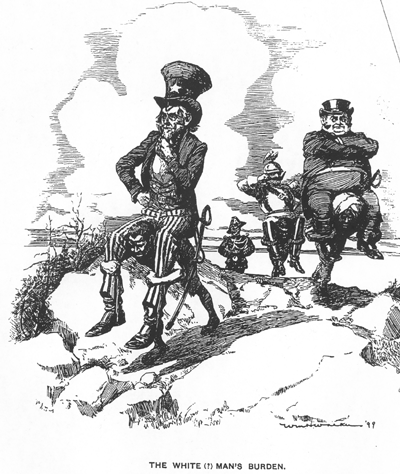- The White Man's Burden
-
The White Man's Burden (dt.: „Die Bürde des Weißen Mannes“) ist ein Gedicht von Rudyard Kipling. Das Gedicht wurde unter dem Eindruck der US-amerikanischen Eroberung der Philippinen und anderer ehemaliger spanischer Kolonien verfasst. Es erschien erstmals 1899 in dem Magazin McClure's und trug bei der Erstveröffentlichung den Untertitel The United States and the Philippine Islands.
Bedeutung
Kipling wurde vorgeworfen in dem Gedicht die außereuropäischen Völker als unterentwickelt und die weiße Rasse als ihnen überlegen darzustellen (wenngleich dies nicht wörtlich im Text so ausgedrückt wird, so wird es doch suggeriert), weshalb das Werk oft als rassistisch und eurozentristisch bezeichnet wird, bereits einige von Kiplings Zeitgenossen wie Mark Twain sahen es sehr kritisch. Der Titel des Gedichts wurde zum polemischen Schlagwort für Bemühungen, Kolonialisierung zum humanitären Akt umzudeuten.
Text
Take up the White Man's burden—
Send forth the best ye breed—
Go bind your sons to exile
To serve your captives' need;
To wait in heavy harness,
On fluttered folk and wild—
Your new-caught, sullen peoples,
Half-devil and half-child.
Take up the White Man's burden—
In patience to abide,
To veil the threat of terror
And check the show of pride;
By open speech and simple,
An hundred times made plain
To seek another's profit,
And work another's gain.
Take up the White Man's burden—
The savage wars of peace—
Fill full the mouth of Famine
And bid the sickness cease;
And when your goal is nearest
The end for others sought,
Watch sloth and heathen Folly
Bring all your hopes to naught.
Take up the White Man's burden—
No tawdry rule of kings,
But toil of serf and sweeper—
The tale of common things.
The ports ye shall not enter,
The roads ye shall not tread,
Go make them with your living,
And mark them with your dead.
Take up the White Man's burden—
And reap his old reward:
The blame of those ye better,
The hate of those ye guard—
The cry of hosts ye humour
(Ah, slowly!) toward the light
“Why brought he us from bondage,
Our loved Egyptian night?”
Take up the White Man's burden—
Ye dare not stoop to less—
Nor call too loud on Freedom
To cloak your weariness;
By all ye cry or whisper,
By all ye leave or do,
The silent, sullen peoples
Shall weigh your gods and you.
Take up the White Man's burden—
Have done with childish days—
The lightly proferred laurel,
The easy, ungrudged praise.
Comes now, to search your manhood
Through all the thankless years
Cold, edged with dear-bought wisdom,
The judgment of your peers.Weblinks
- Loske.org, Rudyard Kipling, The White Man’s Burden, abgerufen am 25. Oktober 2007 - Gedicht als PDF-Download in englischer und deutscher Fassung
- AG Friedensforschung an der Universität Kassel, Amerikas Mission, abgerufen am 25. Oktober 2007
- Informationsstelle Militarisierung (IMI) e.V., Amerikas Mission, abgerufen am 25. Oktober 2007 – Der gleiche Artikel als PDF-Download
Wikimedia Foundation.

